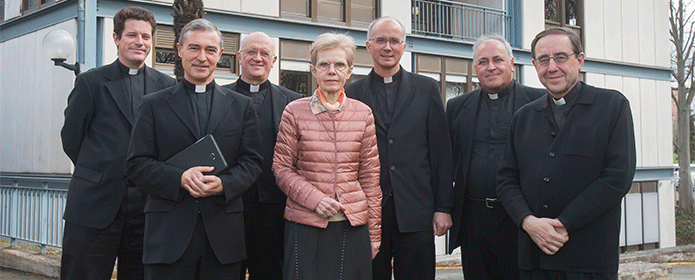More than a hundred people attended a workshop on Romano Guardini, on the 50th anniversary of his death.
The conferences focused on the figure of the Italian-German philosopher and his work "The Spirit of the Liturgy", one of the most influential books of the Second Vatican Council.

More than a hundred people attended quotation in a workshop on Romano Guardini, organized by the School of Theology of the University of Navarra, on the 50th anniversary of the death of the outstanding philosopher and theologian of the twentieth century.
The first session, given by the professors of the School Juan Luis Lorda, Elisabeth Reinhardt and José Manuel Fidalgo, has revolved around his figure and the work he played in the training of the young people of his time. As Professor Lorda pointed out, "Guardini lived in a time of widespread disappointment with the cultural and social capacities of liberalism, which resulted in youth movements with new ideals; a movement that also reached the Catholic world". In this context, "he developed a lively awareness of the cultural change of the time and reflected on how young people should be formed in this environment: his training had to be marked by freedom and the experience of the liturgy," he said.
For her part, Professor Reinhardt explained that Guardini "led young people to experience the Church from within and the way he transmitted the Truth to them was through personal and spontaneous conversations in a relaxed atmosphere. Professor Fidalgo added that his proposals continue to be valid today, "in terms of the basic attitude he adopted with young people: learning to see the world with the eyes of Christ, opening up and taking seriously the reality of the world".
On the occasion of the centenary of the publication of The Spirit of the Liturgy, the most significant work of the Italian-German philosopher, professors Eduardo Torres, Félix María Arocena and Alfonso Berlanga have reflected, in a second session, on the contribution to theology of what has been one of the most influential texts in the liturgical movement in Europe.
In his speech, Professor Felix Maria Arocena made reference letter to the so-called "specificity of liturgical theology", assuring that "the substance is not given without the form". He also explained that in modern times, where thought was given preponderance, liturgical rites were seen as a peripheral issue. However, as he pointed out, "in the liturgy the mystery is given handcuffed to the form; to the ritual patrimony of the whole Church".
In this regard, Professor Berlanga has reviewed Guardini's main publications on the liturgy, which continue and expand the intuitions of his 1918 work. The core of the liturgical act challenges the other theological and biblical disciplines, since Guardini himself goes so far as to affirm that it consists of "the Person, the Life and the action of Christ the Lord". His philosophical concept of the eviterno together with that of the memorial allow us to understand the presence of the paschal mystery in our celebrations.
With respect to the validity of the philosopher's writings, Professor Torres affirmed that this lies in his symbolic conception of the liturgy, which allows the presence of God, truth and absolute beauty to be given in a concrete and palpable form. On the other hand, he denounced the danger of reductionism in the priesthood and defended the relationship of the liturgy with the witness of Christian existence.
